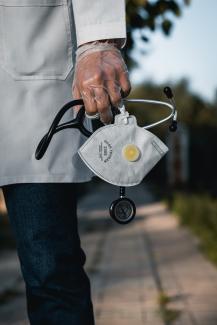
The Saving of a Life
This is a personal story involving treasured friends. Names have been changed to protect privacy, but the situations described are factual. Both individuals were in professions that required the nurturing of strong client relationships. They knew their clients and their clients knew them, many becoming true friends. That may have saved their lives one fateful day.
It is not uncommon for a person who is suffering a major medical event such as a heart attack, stroke, heat exhaustion, delirium, or other life-threatening circumstance, to not understand, or even deny, what is happening to them. They may resist help, even forcibly and stubbornly.
Susan was on the phone with a longtime client in another state. She didn’t realize that her speech was slurred. She was not making sense. He said, “Susan, there’s something wrong. You may be having a stroke.” She insisted that she was perfectly fine. He knew her address and kept her on the phone. On another line he dialed local 911 and had the operator contact 911 in Susan’s area. He kept talking with Susan until emergency responders arrived.
Susan received immediate and perhaps life saving attention, later expressing appreciation for her client and friend who had the presence of mind to take action. Sadly, however, her health continued to deteriorate over time, and she passed away a few years later in a nursing home after being cared for by her brother.
A similar story had a better long-term outcome. A friend, call him Tom, was in his front yard talking on his cell phone with a client who is a dear friend as they share many sports interests. Tom thought he was fine, lucid. In reality he was uttering nonsensical gibberish. Knowing something was seriously wrong, his friend, who lived nearby, put Tom on hold and called 911, directing them to Tom’s home. He kept Tom on the line until help arrived.
He alerted Tom’s wife who met her husband at the emergency room. Again, a timely response saved a life. With treatment for his underlying conditions and with continued monitoring, Tom is still active, doing well, and enjoying retirement.
When our republic was formed, Benjamin Franklin pronounced, “Our new constitution is now established, everything seems to promise it will be durable; but, in this world, nothing is certain except death and taxes.” You will pay taxes and most certainly you will die. But as you traverse the road of life you also will have accidents, be sick, and possibly be disabled.
Death, at some point, is a 100% certainty. Yet according to a 2022 report from CNBC, only 33% of Americans have wills, trusts, or living and testamentary estate plans in place. That means that 67% of our population has left what happens to their assets in case of disability or death up to others, including the state.
They have left what happens to their not-yet dead body up for grabs. Who has authority to make medical decisions for you if you were deathly ill, severely injured, comatose, or otherwise unable to make lucid decisions? Parents, once your teenager turns 18 and is deemed an adult under the law, you are not able to make decisions for your offspring without being designated to do so under a Durable Power of Attorney for Health Care. If you’re a single adult, who would make decisions for you? If you were a Susan or Tom and you’re having a health crisis but you think you’re fine, someone you trust should have the power to intervene, get the care needed, and deal with the doctors, nurses, and the hospital. What about dealing with assets, accessing funds to pay for your care? Who has a Durable Power of Attorney for Assets so as to be able to handle financial and other affairs if you cannot?
We all suffer from common impediments to timely planning, including being busy, procrastination, and not understanding the odds of potentially life altering events. National Underwriter, a provider of tax, insurance, and financial planning information, recently published a study indicating that most people estimate that they have only a 16% chance of being disabled during their working years. Yet, men have a 43% chance of being seriously disabled during their working years; women, a 54% chance. At age 42, you are four times more likely to become seriously disabled than to die during your earning years. Close to 90% of disabling accidents and illnesses are not work related.
Financial advisors are all over radio and television trumpeting a happy retirement. Fine. But a bigger issue are the bumps in the road along the way for which you are unprepared financially and otherwise. How could illness, disability, and premature death involving breadwinners derail plans and fracture your family? Loss of a loved one is sad enough, but stress and complications due to planning failures compound the agony. Unexpected illnesses and injuries cause over 350,000 personal bankruptcies and almost 50% of mortgage foreclosures annually.
A discussion about life and disability insurance, employer benefit packages, and living and testamentary estate planning, may not be a hot button issue in your mind, but it should be. Your marriage, all of your plans and happy thoughts, could blow up due to lack of planning. Parents, if you have a grown child in the gig economy, self-employed with no benefit packages or protections in place, are you going to pick up the tab? How does that impact your “happy retirement” dreams? If you are that young adult just starting out, what plans are you making for self-sufficiency?
Serious stuff, indeed!

